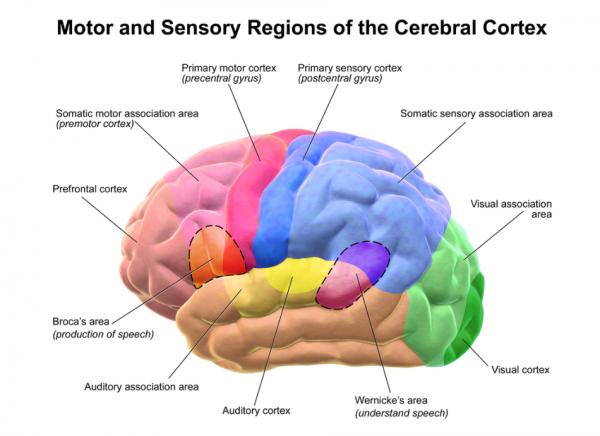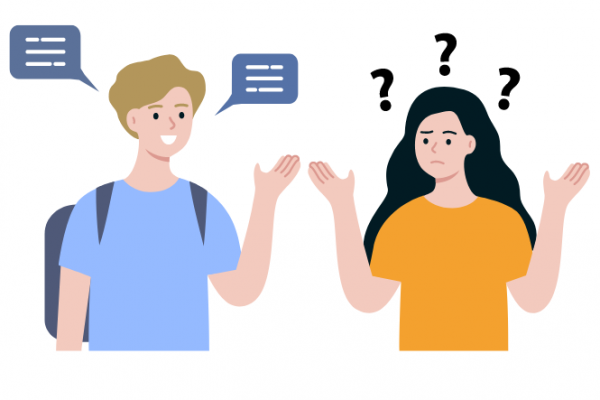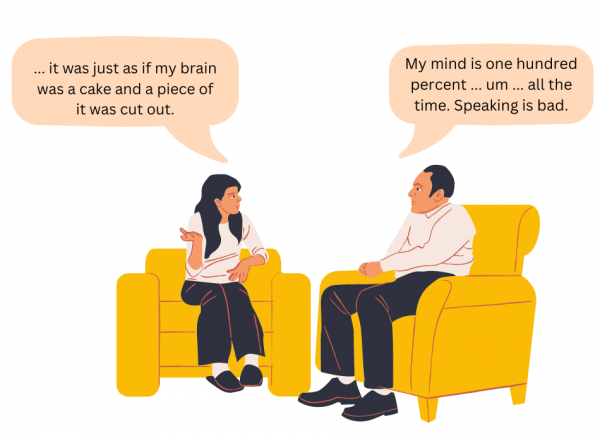- More than 17,000 New Zealanders have stroke-acquired aphasia – a language disorder caused by damage to parts of the brain that control language.
- It may develop after a stroke, head injury, brain tumour or as part of a degenerative condition.
- Aphasia is not a loss of intelligence.
- Someone with aphasia may find it hard to talk, write, read, and understand what's being said.
- Aphasia affects each person differently and can be mild to severe. Someone who has aphasia might not have a physical disability, or appear to be any different from a person without aphasia.
- Communication difficulties may change from day to day – some days will be better than others.
- Being patient and finding the best ways to communicate with your loved one is an important part of aphasia treatment and recovery.
- Apraxia of speech may accompany aphasia. Apraxia is when you know what you want to say but your brain has trouble communicating with your speech muscles.
We're aware of a problem when trying to use Zero Data to link to Healthify. Zero Data is managed by Health NZ and we are working with them to get this fixed.
Aphasia
Pronounced 'aye-faze-yuh'
Key points about aphasia
- Aphasia is a disorder that affects communication, generally after a stroke or head injury.
- Aphasia is a loss or disruption of language – it's not a loss of intellect, vision or hearing.
- Aphasia affects each person differently and can be mild to severe.
- Being patient and finding the best ways to communicate with your loved one is an important part of aphasia treatment and recovery.

Aphasia is the partial or total loss of the ability to articulate (put into words) ideas or understand spoken or written language. It results from damage to the brain caused by injury or disease. Aphasia may be accompanied by apraxia of speech – read more below.
This video provides a simple explanation of aphasia and how you can communicate better with someone who has it.
Video: What is aphasia?
Aphasia is usually thought of as either fluent or non-fluent. The severity of aphasia can vary greatly, and each person’s aphasia is unique to them.
Fluent aphasia
People with fluent aphasia may talk easily but their speech lacks content and is difficult for other people to understand. They often think they're making sense to other people and aren't aware of the extent of their aphasia. People with fluent aphasia struggle to understand what other people say or write. Fluent aphasia is also known as Wernicke’s aphasia.
Non-fluent aphasia
People with non-fluent aphasia usually have difficulty finding words and may have effortful speech. They are usually aware of their own difficulties and their understanding of language is better than their ability to express themselves. Non-fluent aphasia is also known as Broca’s aphasia.
There are many ways of categorising and describing aphasia.
This diagram shows the location of Wernicke's and Broca's areas in the brain.

Image credit: Medical gallery of Blausen Medical 2014 via Wikimedia Commons(external link)
Primary progressive aphasia (PPA)
PPA is a rare condition caused by gradual damage to the areas of the brain that control language. It causes difficulty with finding the right words, understanding what people are saying and with reading and writing.
PPA is a type of fronto-temporal dementia and therefore more widespread cognitive changes occur over time. However, it’s not the same as Alzheimer’s disease. Frontotemporal dementia is the most common cause of dementia in people under the age of 65 years.
There are 3 different subtypes based on which abilities are affected:
- Semantic dementia – where people have difficulty remembering the meaning of words
- Progressive non-fluent aphasia – where people find it harder to speak and make mistakes in how they say words and sentences
- Logopenic aphasia – where people have trouble finding the words they want to use.
Unlike the other types of aphasia, people with PPA won’t experience any improvement, but will continue to lose their language abilities.
People with PPA can benefit from speech-language therapy as they and their whānau adjust the way they communicate.
It may be helpful to carry an identification card to show people and help them understand your communication issues(external link). Some communication-assistive devices can also be useful.
Aphasia is most often caused by stroke – about a third of the people who suffer a stroke will get aphasia. This means there are more than 17,000 Kiwis currently living with aphasia, maybe up to 20,000 as the exact numbers aren't known.
Aphasia can also happen after:
- a head injury
- a brain tumour
- another neurological disease.
Aphasia can occur at any age, however about 75% of cases occur in older people. The impact of aphasia on families can be enormous.
If your healthcare provider thinks you have aphasia, you may be sent to a speech-language therapist. They will test your ability to:
- understand language
- talk and have a conversation
- read
- express thoughts
- write
- use other forms of communication.
 Image credit: Canva
Image credit: Canva
Sometimes a full recovery from aphasia can be made without any treatment.
- This kind of recovery usually happens after a stroke where blood flow to the brain is only interrupted for a short time, then quickly re-connected.
- This is known as a transient ischemic attack.
- In this situation, full language capacity can return within hours or days.
Mostly, however, language recovery is slow and less complete.
- Even though many people with aphasia achieve some quick recovery, where some language ability returns within a few days to 3–4 weeks after the brain injury, some level of aphasia usually remains.
- In these cases, speech-language therapy can be very useful.
- Recovery can continue over a long time period, although the most rapid improvements usually happen within the first 6 months.
What factors affect recovery from aphasia?
Many health professionals think that treatment is most effective early in the recovery period. Some factors that affect recovery and improvement are:
- the specific event that caused the brain damage
- the part of the brain that was damaged
- the seriousness of the brain injury
- the age and health of the person
- motivation to get better
- being socially connected to whānau, friends and support groups.
Aphasia therapy tries to improve a person’s communication by helping them to:
- use their remaining language abilities
- get back as much language ability as they can
- adjust for ongoing language problems
- learn different ways of communicating.
Therapy can take place one-on-one to meet individual needs, or in a group setting where people can practice and learn different ways of communicating with others.
Computer-aided therapy for aphasia
The use of computers to bring back the language abilities of people with aphasia has been used with some success:
- Studies have shown that computer-aided therapy can help people with aphasia recover specific parts of speech, eg, remembering how to use verbs.
- Computers also offer another communication option for people with trouble expressing language.
- Your speech language therapist can help you to find the most appropriate therapy apps for your aphasia.
Aphasia Therapy Online(external link) is a free programme provided by an Australian speech pathologist.
Apps reviewed by Healthify
You may find it useful to look at some Communication apps.
Aphasia would be like going to bed tonight then waking up in a different country where you don't speak the language. If you had aphasia you may find it hard to do the following:
- Speak – ask for milk at the supermarket, get directions from a passer by, have conversations, use the phone.
- Understand what is being said – talk to people, understand jokes, watch TV.
- Write – sign your name, fill out forms, write a letter.
- Understand what you're reading – whether it be magazines, books or street signs.
- Say what you want to say – you know what you want to say but can’t find the right words. You may have to rely on gestures and facial expressions.
- Use numbers – work out change when you’ve bought something or use the ATM.

Image credit: Canva
Quotes from people with aphasia
Imagine how frustrating it would be to know what you want to say, but not be able to communicate what you’re thinking. These quotes from people with aphasia give us some idea what it’s like:

Image credit: Canva (amended)
Communication problems will tend to be worse in a noisy environment, or if the person with aphasia is feeling tired, ill or under stress.
Finding ways to communicate with your loved one is an important part of aphasia treatment and recovery. These are a few methods you can try to improve communication with a person with aphasia:
- Speak clearly, and quite slowly – put pauses in your speech, think of them like commas and full stops in your speaking.
- Give them plenty of time to respond.
- Avoid background sounds/interruptions and people speaking at the same time.
- Try to use simple, short and clear sentences – one topic at a time.
- Use simple and easy gestures with your speech to support what you're talking about.
- Always have a pen and paper with you to write down the key points, or do drawings. Some people will find writing or reading easier than talking.
- Use yes/no questions – eg, ‘Do you want an apple?’ not ‘What do you want to eat?’
- Provide options – eg, ‘Do you need to visit the supermarket or the bank?’
- Be honest if you don't understand and double check that they have understood what you said.
- To help understanding of lengthy or complex information, break the information into smaller chunks.
- If frustration or tiredness is affecting your communication, agree to take a break and come back to it later.
- Be flexible – try different ways of communicating, try to understand their overall message, be realistic, never expect or aim for perfect conversation.
- Ask for help.
Both apraxia and aphasia are communication disorders. Apraxia is a motor speech disorder that may accompany aphasia. Apraxia is caused by damage to the parts of the brain that control muscles needed for speech, eg, your lungs, voice box, lips and tongue. It's not due to muscle weakness but to a lack of communication between your brain and those muscles. You know what you want to say, but your brain has difficulty in telling the speech muscles how to move. It most often happens after a stroke or a head injury.
Apraxia of speech may vary from occasional problems with saying a word to not being able to speak at all. Some people recover quickly, others take a lot longer. You can read the Health Info information on apraxia of speech(external link) to find out more.
Support groups can help both the person with aphasia and their whānau with the changes that come with aphasia and stroke.
Support services, resources, advocacy, & information for people with aphasia & their caregivers/whanau(external link) Aphasia New Zealand Charitable Trust
Support resources, stories, news and updates(external link) The National Aphasia Association
Support for PPA
Aphasia NZ(external link)
Dementia New Zealand(external link)
Alzheimer’s New Zealand(external link)
About aphasia(external link) Aphasia NZ
Information about stroke(external link) Stroke Foundation of NZ
Neurological disorders and traumatic brain injury(external link) The Hopeworks Foundation
What is aphasia?(external link) The Internet Stroke Centre
Different kinds of aphasia(external link) The National Aphasia Association
Apraxia of speech(external link) HealthInfo, NZ
Resources
AphasiaNZ(external link) produces a 12-page booklet explaining aphasia. It’s available in English, te reo Māori, Samoan, Tongan, Chinese and Hindi. There are also booklets on aphasia due to brain tumour, and Primary Progressive Aphasia. Email them for a copy.
Communication supports for people with aphasia(external link) TalkLink Assistive Technology Services
Apps
TalkPath Therapy(external link)
Communication apps
References
- Aphasia New Zealand Charitable Trust(external link) NZ(external link)
- Primary progressive aphasia (PPA)(external link) Aphasia New Zealand Charitable Trust, NZ(external link)
- Apraxia of speech(external link) HealthInfo, NZ, 2021
Credits: Healthify editorial team. Healthify is brought to you by Health Navigator Charitable Trust.
Reviewed by: Kate Milford, Aphasia Advisor, Aphasia NZ
Last reviewed:





